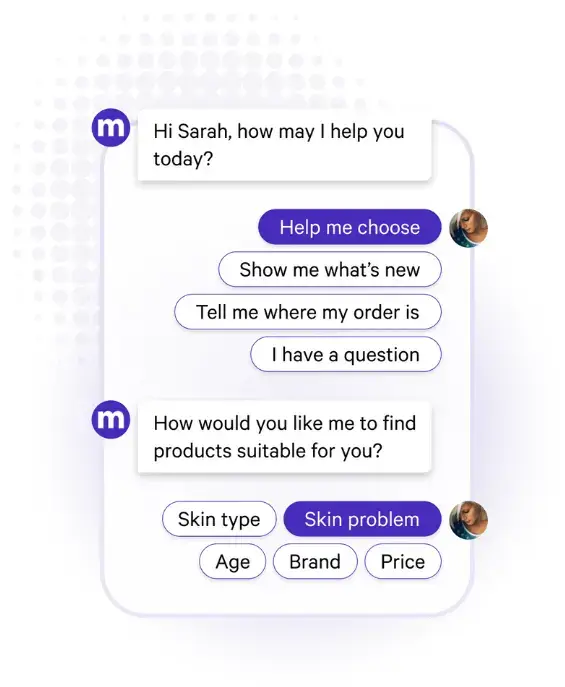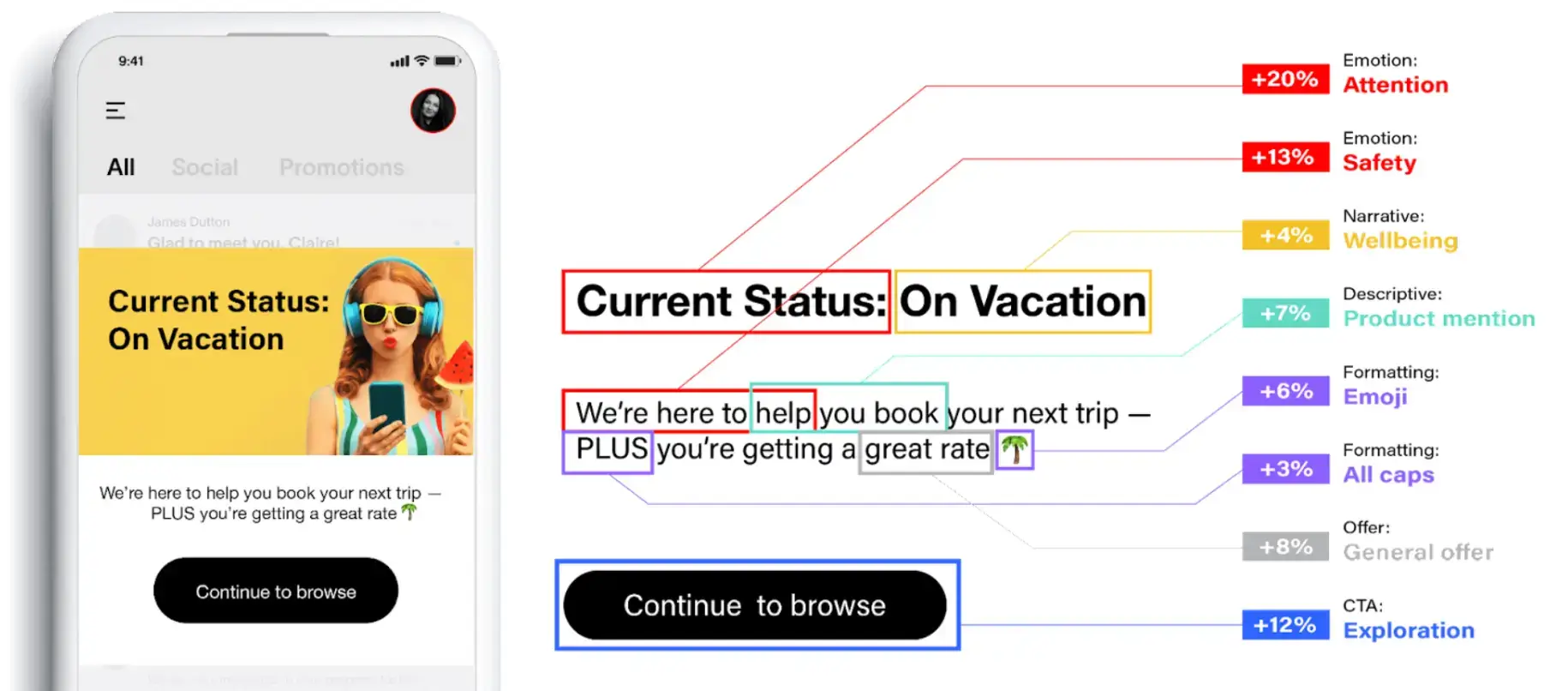Artificial intelligence (AI) has infiltrated nearly every aspect of eCommerce, from personalized recommendations to predictive analytics. Now, AI is poised to transform online advertising.
*Updated 03/24/2025
2024 was the year when AI and machine learning became integral to digital marketing campaigns, and now, leveraging AI for eCommerce is emerging as the top trend that no business can afford to ignore.
This article will explore how AI is revolutionizing eCommerce advertising and why AI-powered ads represent the next frontier for digital marketers.
We’ll look at key capabilities that set AI advertising apart, from precision targeting to campaign optimization driven by real-time insights.
Shortcuts:
- The Year AI Redefines eCommerce Ads
- AI-Driven Strategies for eCommerce Success
- Optimizing Customer Experience with AI
- Overcoming the Challenges of AI Implementation
- The Future Long-Term Impact in eCommerce AI

With AI delivering unprecedented efficiency and performance, eCommerce brands that fail to incorporate it into their strategy risks falling irreparably behind the competition. The AI train is leaving the station – it’s time to get on board.
The Year AI Redefines eCommerce Ads
The writing has been on the wall—artificial intelligence has transformed digital commerce.
For context, look back to 2021. Some of today's AI advertising functionality first emerged then, however, it remained siloed, delivering gains for early adopters rather than disrupting the broader sphere.
Machine learning transitioned from an emerging innovation to a fundamental necessity. Companies could no longer consider themselves serious players in eCommerce advertising without incorporating machine learning capabilities.
Predictive analytics and campaign optimization also gained widespread adoption. The AI marketing stack became more comprehensive and integrated.
Three catalytic forces have aligned to catapult AI's impact across eCommerce:
- A quantum surge in accessible data from unstructured sources
- Real-time integration and intelligent orchestration
- Radical leaps in computing power through cloud infrastructure
Fueled by these accelerants, AI advertising solutions of the future will operate akin to an autonomous nervous system for digital campaigns.
For eCommerce brands, the latest innovation brings cross-channel intelligence, unprecedented automation, and optimization at a granular level.
With AI assuming a command role, it will separate progressive marketers from the pack. The new question: How far ahead can AI propel your strategy?
-
Innovations driving change
Several cutting-edge advancements converge to significantly transform eCommerce advertising in the coming years. Key innovations include:
-
- Advanced Machine Learning Algorithms: Sophisticated neural networks can analyze large amounts of data to optimize ads. New techniques accelerate campaign performance.
- Granular Predictive Analytics: Detailed customer behavior insights enable precision 1:1 ad targeting and improved effectiveness.
- Automated Multivariate Testing: AI iteratively tries creative combinations and variables to determine optimal formulations per audience and placement.
- Cross-Channel Attribution: Identifying how each touchpoint influences across channels provides visibility to fuel optimal cross-channel ad distribution.
- Hyper-Personalization: Customer insights plus real-time context like location enable mass customization of relevant “moments.”
AI-Driven Strategies for eCommerce Success
-
Tailoring AI to eCommerce needs
AI-powered services by Vondy can remove the guesswork for eCommerce businesses by powering data-backed insights. Tactics differ based on business needs:
- B2B eCommerce companies can implement predictive lead scoring to inform refined targeting and sequenced multi-channel campaigns to drive more qualified conversions.
- Customer data platforms centralize first-party data to uncover intent signals for precisely personalized messaging.
- B2C brands can feed consumer behavioral and profile data into machine learning algorithms to enable dynamic customer segmentation.
- These automated segments then power highly relevant ads and timely cross-sell/upsell recommendations tailored to individual customers.
- C2C platforms can utilize AI to uncover trend predictions by analyzing consumer browsing and transaction data.
This allows us to identify moments primed for engagement when consumers demonstrate purchase intent signals. Targeting ads or recommendations at those high-potential instances improves results.
-
Advanced AI tools for eCommerce advertising
Cutting-edge platforms serve as the engines for AI advertising transformation by leveraging data and algorithms to optimize efforts:

AI-Powered Chatbots
-
- Provide 24/7 customer support.
- Identify high-intent users for targeted ad sequences.
- Personalized Recommendations
-
- Match products to user needs and interests.
- Increase conversions with hyper-relevant suggestions.
- Predictive Budget Allocation
-
- Forecast demand signals to optimize spending.
- Improves campaign ROI through insights.
- Automated Ad Creation

-
- Iteratively generates high-performing creative variants.
- Tailors messaging to resonate with target users.
- Cross-Channel Campaign Management
- Orchestrates synchronized messaging across channels.
- Presents the unified brand experience.
With these and an expanding array of innovations, AI empowers data-backed intelligence to revolutionize eCommerce advertising.
Optimizing Customer Experience with AI

-
Personalization at scale
AI empowers eCommerce brands to tailor experiences for every customer interaction based on data-backed insights.
Detailed customer profiles, powered by analyzing account history, browsing patterns, purchase predictors, and more, allow personalization at scale.
Shoppers engage more with customized digital marketing content that caters to their demonstrated preferences, such as blog posts discussing use cases of interest or videos addressing pain points they’ve experienced.
Unique special offers tempt individuals based on purchase propensity models predicting what deals will motivate them.
-
Enhancing customer journey with AI analytics
Sophisticated analytics can further augment understanding the customer journey to optimize their experience.
Sentiment analysis scans user-generated content, such as reviews, social posts, or inquiries, to swiftly detect pain points that require resolution.
Aside from marketing, these techniques can also be used for product development, as demonstrated by Mackmyra AI-made whiskey:

Source: Mackmyra
Predictive models forecast the lifetime value of customer segments, distinguishing high-loyalty shoppers warranting retention focus.
Connecting usage patterns to offer timing or abandonment signals guides optimization. Overall, AI generates the rich insights needed to continually refine touchpoints and exceed customer expectations.
Overcoming the Challenges of AI Implementation
-
Navigating ethical and privacy concerns
As AI influences more customer touchpoints, ethical usage and data privacy grow imperative:
-
- Inform users when AI is involved and obtain consent for personalized experiences.
- Allow users to opt-out while still providing core functionality.
- Anonymize customer data inputs to algorithms by eliminating personally identifiable information.
- Conduct bias reviews on AI models to combat unfair algorithmic prejudice.
- Enable data access, corrections, or deletion via formal request processes.
Proactive self-governance and responsible transparency build consumer trust.
-
Building AI competency in eCommerce teams
First, leadership buy-in is vital for AI adoption. Executives must actively support implementation efforts across the company. Providing adequate budget and headcount fuels progress.
Second, equip teams with technical and strategic skills. Training tailored to each department’s needs will enable them to utilize AI tools effectively.
Complement training with an open culture encouraging knowledge sharing as best practices evolve.
Finally, streamline processes and unify data. Refine workflows to seamlessly incorporate analytics-based insights and automation.
Interactive dashboards break down siloed visibility for holistic understanding. With the proper governance, skill building, and infrastructure in place, AI can elevate customer and company goals in equal measure.
The Future Long-Term Impact in eCommerce AI
-
Predictions and trends
While 2024 was likely the true breakout year for AI adoption, its role will only expand in the coming years.
Expect AI to become integral to an eCommerce brand’s nervous system - orchestrating operations, augmenting workers, and fueling innovation.
Advances in natural language processing and computer vision facilitate increasingly intuitive human-machine collaboration.
As barriers to sophistication and customization of AI solutions fall, smaller players will tap into the power of AI, leveling the playing field.
-
Adapting to future AI advancements
To stay ahead, eCommerce leaders must embrace a state of perpetual adaptation and growth:
-
- Foster a culture of experimentation and innovation adoption
- Architect flexible technology stacks using composable business services
- Regularly upskill teams on AI best practices as they evolve
- Closely monitor advances in academia and industry labs
- Maintain an integrated foundation of ethical AI governance
Making allies of emerging tech rather than resisting change is key to leading amidst accelerating digital disruption.
Conclusion: Embracing the AI Revolution in eCommerce
AI's potential is boundless - from predictive intelligence to unprecedented personalization and breakthrough automation.
Early adopters who reimagine business models will realize disproportionate gains. With customers and companies thriving in balance, AI might just improve commerce. The revolution beckons. Are you ready?


